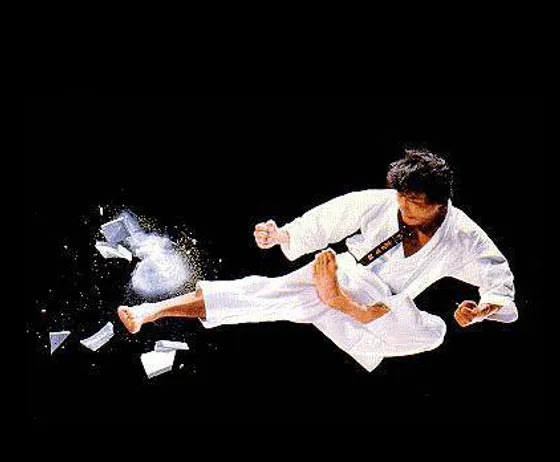Filozofia KWF
"Dlaczego ludzie lękają się i podziwiają siłę, która może pozbawić ich życia w jednej chwili, jednocześnie dostrzegając w niej piękno?
Jeżeli zdefiniujemy Karate jako sztukę walki jednym ciosem kończącym, to ci którzy podążają tą drogą muszą trenować swoje ciała by każdy cios lub kopnięcie kipiały energią, budziły lęk przed ciosem kończącym.
Musimy żyć doceniając każdy moment życia, który zawsze mieści się w granicach między życiem a śmiercią. To właśnie tam dostrzegamy piękno naszego ducha i technik karate. Musimy doskonalić nasze techniki, ducha, a nawet najprostsze czynność, dopóki piękno nie zakorzeni się w naszej postawie do codziennego życia. Im więcej trenujesz, im więcej rozwijasz miłość, tym bardziej rosną oddanie i bogactwo wewnętrzne. Droga Karate jest wyrazem sztuki, gdyż jako ludzie mamy w naturze czynić siebie wyrazem piękna. Podążajmy drogą KARATE wspólnie."
Wywiad z Matem Price - przeprowadził Shaun Banfield (The Shotokan Way):
"Mam wiele opowieści z Japonii, ale moja ulubiona jest z 2009 roku, kiedy trenowaliśmy w dojo Senseia Yahary. Nasza grupa składała się z około dwunastu osób i zostaliśmy poinstruowani by przyjść w sobotę, a sensei Yahara, Isaka i Ibusuki będą nas nauczać. Kiedy przybyliśmy trenować byliśmy tam właściwie tylko my i mała garstka najwyższych stopni. Na początku lekcji Sensei Yahara zwołał nas w koło i powiedział, że dopóki nie powiemy mu czym jest karate nie będzie nas uczył i będziemy musieli wyjść. Możecie sobie wyobrazić, pod jak wielką presją się znaleźliśmy. Zaczęliśmy udzielać odpowiedzi. Sensei Yahara wydawał się coraz mniej zadowolony i już widziałem jak wychodzimy bez wykonania chociaż jednego ciosu. Wymieniłem zmartwione spojrzenia z Nickiem Healdem, kolegą instruktorem LKA, i kiedy już myślałem że będziemy musieli wychodzić, powiedziałem, że karate jest świetną metodą bicia ludzi. Sensei był tym zachwycony i wygłosił mowę o tym jak musimy ćwiczyć z celem zabicia przy każdym wykonanym ciosie. Takie karate było sztuką zabijania. Nie ważne czy się z nim zgadzacie czy nie, na pewno był to ciekawy wstęp do sesji treningowej i przygotowanie by ćwiczyć mocno."
http://www.theshotokanway.com/aninterviewwithmattprice2014.html
"Mam wiele opowieści z Japonii, ale moja ulubiona jest z 2009 roku, kiedy trenowaliśmy w dojo Senseia Yahary. Nasza grupa składała się z około dwunastu osób i zostaliśmy poinstruowani by przyjść w sobotę, a sensei Yahara, Isaka i Ibusuki będą nas nauczać. Kiedy przybyliśmy trenować byliśmy tam właściwie tylko my i mała garstka najwyższych stopni. Na początku lekcji Sensei Yahara zwołał nas w koło i powiedział, że dopóki nie powiemy mu czym jest karate nie będzie nas uczył i będziemy musieli wyjść. Możecie sobie wyobrazić, pod jak wielką presją się znaleźliśmy. Zaczęliśmy udzielać odpowiedzi. Sensei Yahara wydawał się coraz mniej zadowolony i już widziałem jak wychodzimy bez wykonania chociaż jednego ciosu. Wymieniłem zmartwione spojrzenia z Nickiem Healdem, kolegą instruktorem LKA, i kiedy już myślałem że będziemy musieli wychodzić, powiedziałem, że karate jest świetną metodą bicia ludzi. Sensei był tym zachwycony i wygłosił mowę o tym jak musimy ćwiczyć z celem zabicia przy każdym wykonanym ciosie. Takie karate było sztuką zabijania. Nie ważne czy się z nim zgadzacie czy nie, na pewno był to ciekawy wstęp do sesji treningowej i przygotowanie by ćwiczyć mocno."
http://www.theshotokanway.com/aninterviewwithmattprice2014.html
Yahara Mikio
Fragmenty wywiadu dla KWF Rosja - przygotował Oleg Larionov
Nazwa waszej organizacji to Karatenomichi World Federation. Czy istnieje różnica między Karatenomichi i Shotokan? Proszę powiedzieć nam, czy uczysz karate Shotokan, czy to nieco inny styl karate?
Styl Shotokan jest oryginalnym stylem i to czego uczę jest prostą sprawą: karate zmieniało się w czasie swojego istnienia i teraz jest zagrożone zniknięciem. Ja znam karate jako sztukę walki, ale obecnie karate wydaje się być bardziej jak taniec. Chciałbym powrócić do oryginalnego karate, do jego korzeni.
Styl Shotokan jest oryginalnym stylem i to czego uczę jest prostą sprawą: karate zmieniało się w czasie swojego istnienia i teraz jest zagrożone zniknięciem. Ja znam karate jako sztukę walki, ale obecnie karate wydaje się być bardziej jak taniec. Chciałbym powrócić do oryginalnego karate, do jego korzeni.
Budo karate, według mnie, jest wtedy gdy mogę ostatecznie pokonać przeciwnika przez jeden zabójczy cios.
Moja praca skupia się głównie na obieraniu kierunków i tworzeniu metod, które zwiększą mój poziom techniczny, do perfekcji której wymagam: tylko jeden cios powinien wystarczyć by pokonać przeciwnika. Chcę nauczyć moich uczniów by byli w stanie wygrać wszelkie zawody i następnie rozsyłać ich po świecie. Pragnę ludzi znających moje techniki i moje podążanie za perfekcją. Karate sportowe jest obecnie bardzo popularne i wiele osób traktuje karate jak grę. Ci ludzie zwykle zapominają o karate natychmiast po zawodach. Chciałbym by moi podopieczni mogli używać karate w swoim życiu codziennym, a nie tylko bawić się w karate jak w grę.
Sensei, czy uważasz że zawody pomagają nam lepiej zrozumieć esencję Budo?
Jestem przeciw tego typu zawodom, które promują rozwój "rozrywkowego" karate. Jest jednak tak, że zawsze muszę debatować i rozmawiać z przedstawicielami innych organizacji by bronić mojej opinii o karate. Być może moje działania przypomną im o prawdziwym karate.

